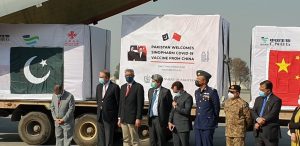With the resumption of global travel on the horizon, vaccine passports may be a ticket to freedom for millions of vaccinated individuals across the globe. But they also pose an ethical dilemma.
As immunization campaigns ramp up, a patchwork of vaccine approvals across countries and regions is laying the foundation of a global vaccine bifurcation that may determine where one can travel, study, and seek employment.
The World Health Organization (WHO) says we need to vaccinate at least 70 percent of the global population by June 2022 to end the pandemic. “To do that,” said WHO’s Director General Tedros Adhanom Ghebreyesus at the G7 Summit last month, “we need 11 billion doses.”
At the same conference, British Prime Minister Boris Johnson announced that the United Kingdom would donate over 100 million doses of COVID-19 vaccines, while U.S. President Joe Biden promised 500 million doses to poor countries under the WHO-Gavi-CEPI-UNICEF initiative, COVAX.
The offer came following strong criticism of rich countries hoarding vaccines.
So far, the European Union has secured 900 million doses of Pfizer-BioNTech vaccine with an option to buy another 900 million to be delivered by 2023, leaving the EU with 6.6 doses per person, excluding the optioned ones. The U.S. has signed agreements for 1.3 billion doses while Canada has brokered deals for 238 million shots for a population of 40 million – that’s at least five doses per citizen for both countries. The U.K. has secured more than 500 million doses – enough to vaccinate its entire population seven times over and, Australia has ordered at least 179 million doses for a population of 25 million, or 6.8 doses per individual.
More than 3.4 billion doses of COVID-19 vaccines have been administered around the world as of July 9. But more than 80 percent of those jabs have gone to people in high-income and upper-middle-income countries while only 1 percent of the people in low-income countries have received at least one dose of a coronavirus vaccine.
As the global economy contracted amid lockdowns and mobility restrictions, Asia’s overseas workers were among the first to lose their jobs, with millions returning home while thousands found themselves unemployed and stranded.
Migrant workers are a key part of the economies of their country of origin and help in keeping its foreign currency reserves afloat. In the United Arab Emirates alone, there are over 2.75 million Indians, 1.27 million Pakistanis, 740,000 Bangladeshis, and 560,000 Filipinos. Around 2.6 million Pakistanis and Indians and 2.5 million Bangladeshis are working in Saudi Arabia.
Although the world is edging towards normalcy, the nightmare for migrant workers is far from over. Last month, a COVID-19 vaccination center in Pakistan’s capital, Islamabad, was overrun by migrant workers, clamoring for a shot of the Oxford-AstraZeneca vaccine.
The South Asian country received 1.2 million shots of the British vaccine under the COVAX Facility in May, followed by 106,000 doses of Pfizer-BioNTech and 2.5 million Moderna injections. As of July 9, Pakistan has administered over 19 million doses of mostly Chinese Sinopharm, SinoVac, and CanSino vaccines.
But most Gulf nations and the Western world do not recognize Chinese or Russian vaccines despite a WHO authorization, and require incoming foreign workers to be vaccinated with Oxford-AstraZeneca, Pfizer-BioNTech, or Moderna – vaccines short in supply in low-income countries.
These restrictions mean that those who were administered Chinese or Russian vaccines will likely be barred from entering most high-income countries for the foreseeable future, unless they get their hands on an approved vaccine.
In Pakistan, the National Command and Operations Centre (NCOC) has allowed inoculation of Oxford-AstraZeneca, Pfizer-BioNTech and Moderna vaccines to those who need to travel. So a low-income country that has barely vaccinated 6 percent of its population is left with no choice but to double-vaccinate people.
This concern is not exclusive to Pakistan. In a majority of Asian countries, including Bangladesh, Philippines and Sri Lanka, most of the vaccine supply is Chinese. Because when the western world was hoarding vaccines, Russia and China were cementing ties with developing countries through vaccine diplomacy.
Meanwhile, India is struggling to procure authorization for Covishield – a local version of the Oxford-AstraZeneca’s Vaxzevria shot.
Against these challenges, governments must evaluate whether vaccine passports are a ticket to freedom or the path to a divided world.

































